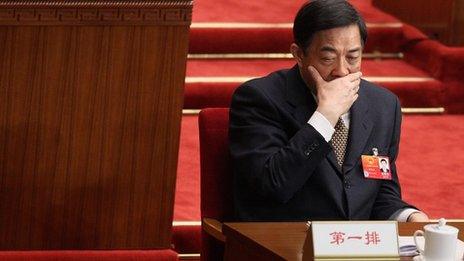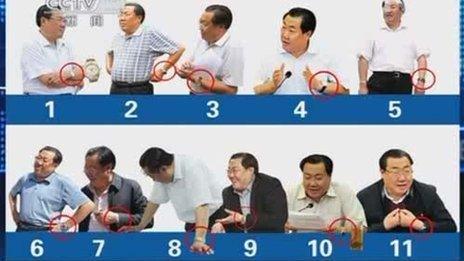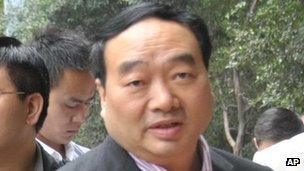Sex, lies and videotapes: A year in Chinese microblogs
- Published
The year 2012 was meant to be a stable one for China as it prepared for its once-in-a-generation leadership change.
But things didn't quite go to script as lurid scandals emerged across the country featuring officials from the all-powerful Communist Party, some of whom were local and some very prominent.
One of the most notable features was the number of scandals unearthed by angry microbloggers determined to root out official corruption.
China's emboldened microbloggers?
As growing concern about corruption and abuse of power spread through China's microblogs, netizens began a quest to expose what they saw as official malpractice themselves.
All of this took place despite official measures such as in March when millions of microblog users, initially in Beijing, had to register with their real identities to post online. It was an effort by the authorities to prevent the spread of what they called "unfounded rumours".
Nevertheless a number of local officials were actually forced to resign after web users took it upon themselves to make public their alleged wrongdoing.
But analysts warn that this cannot be taken as a sign of a vibrant and liberated blogosphere in China. Many of those exposed online were middle and low-ranking figures who were subsequently disciplined by the party. The major stories involving national-level political figures have been quashed or controlled.
Microbloggers could make such exposes partly because the authorities allowed them to do so. Indeed, some argue that allowing this kind of online activism is a safety valve, an alternative to serious political participation or reform.
The biggest scandals: Censors vs bloggers
The most significant furores had little to do with the work of micro-bloggers. The biggest scandal saw the downfall of Bo Xilai, Communist Party chief in Chongqing, who was tipped for the very top - until his wife's conviction for the murder of a British businessman.

Bo Xilai: China's biggest scandal was censored online
The blind Chinese activist Chen Guangcheng also fled house arrest to seek refuge in the US embassy, provoking a diplomatic crisis.
When Wang Lijun, the police chief in Chongqing, sought refuge in the US consulate in Chengdu in February, after falling out with Bo Xilai, the news leaked via microblog posts inquiring about the unusually heavy security outside the consulate.
Speculation online was rife but once Mr Bo was suspended from China's Politburo, the government clamped down.
Online the censors worked harder than ever clamping down on references to the incidents, forcing microbloggers to become ever more creative in their efforts to discuss these., external
For example, Bo in Chinese can mean "thin" so web users who wanted to discuss the scandal as it played out began to refer to him as "not thick" or bu hou. Those who wanted to search for Chen Guangcheng had to refer to "the blind man". Even that was eventually censored.
Then there was the tomato code for Bo Xilai. Tomato in Chinese is Xi Hong Shi, "Xi" means west, "Hong" means red and "Shi" sounds like city. As Mr Bo was known for promoting old-fashioned "red" Maoist priniciples in the western city of Chongqing, calling him "west red city" - Xi Hong Shi - or tomato - made sense to the microbloggers.
Many posters are wry: "Both Wang Lijun and Chen Guangcheng fled to the US consulate/embassy. It seems that these are the safest places in the world."
Investigations into wealth allegedly amassed by the families of politburo members came from journalists outside China and were either rebuffed or ignored.
When Bo Xilai was expelled there was an initial torrent of posts, external but this later appears to have been suppressed.
But the real prizes for the microblog users were the local officials suspected of corruption. A series of stings and online posts ended a number of careers.
Caught smiling at a bus crash
When Shaanxi province safety official Yang Dacai was caught on camera smiling at the scene of a bus crash which killed 36 people, microbloggers began a campaign against him that would end in his dismissal.

The luxury watch collection proved too much
Web users found pictures of him wearing a series of wrist watches that an expert told the China Daily newspaper were worth more than $40,000 (£25,000) in total. People demanded an investigation into his behaviour.
He even fielded questions on his own weibo microblog. He explained that he was trying to relax officials at the time of the crash and "so maybe, in an unguarded moment, I got a little too relaxed myself".
He also explained that he "used legal income" to buy a number of watches but questions were asked about how many luxury watches a provincial official could afford.
He was eventually sacked.
The party official and his teenage mistress
In November screenshots from a sex video apparently featuring Chongqing Communist Party official Lei Zhengfu emerged, reposted many times on Chinese microblogs.

Mr Lei's sacking was one of the most popular subjects on China's microblog sites
The images were purportedly of Mr Lei, 57, having sex with his 18-year-old mistress. Mr Lei insisted the video was fake but local party officials concluded that the man in the pictures was indeed him.
He was removed from office and an investigation is under way.
The BBC's Beijing bureau interviewed Zhu Ruifeng, the investigative journalist credited with exposing Mr Lei. "I am very happy when I battle corrupt officials," Mr Zhu said.
Another official and his twin mistresses
In December a police chief in China's Wusu city was sacked after accusations that he kept twin sisters as mistresses, state media reported.
The allegations against Qi Fang included claims he gave his two mistresses police jobs. They first appeared on a popular website, accompanied in Xinjiang province by a photo showing the scantily-clad mistresses in bed, Xinhua news agency said.
The website also said that Mr Qi rented an expensive apartment for the sisters and charged the rent as an official expense.
A local party official was quoted by Xinhua as saying that while "part of the online allegations" were true, many details "remain unverified".
The policeman's angry son
Just days earlier a top policeman was suspended amid allegations of a cover-up after his son was filmed in a confrontation with police when stopped for drink driving.
State media reported that the deputy police chief of Shanxi province was removed from duties after video was posted online showing the confrontation with police.
A blood alcohol test reportedly showed the son was over the legal alcohol limit, but media reports say he was escorted home by police officers.
A "concubine" and kickbacks?
And also in December, state media reported, external that the mayor of Xingtai in China's Hebei province has become embroiled in a corruption scandal.
Liu Daqun was alleged to have taken kickbacks over land sales and construction projects as well as keeping a mistress, a letter in the name of 29 local cadres which was posted online says.
The letter writers say that Mr Liu's alleged actions have already been reported to the Communist Party. There has been no response from provincial authorities.